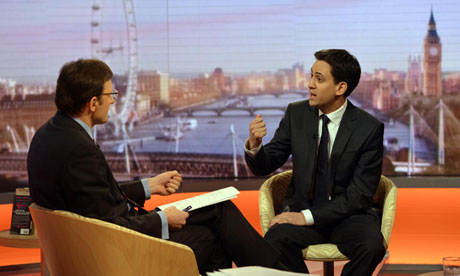
Asked on the Andrew Marr show by interviewer James Landale
(covering for the host who is recovering from a stroke) to explain why he has
led Labour opposition to the removal of child benefit to people earning over
£60,000 and the mooted removal of winter fuel allowance for wealthy pensioners,
Miliband managed to communicate a coherent ideology that if he can clarify over
the next two years might just get ‘One-Nation’ Labour elected back into
government.
He explained that in his mind there is no difference between means
testing child benefit and the winter fuel allowance and means testing entry to
an NHS hospital or a State school. This is linked to the concept that universal
benefits allow the UK population to retain a link to the welfare state that is
not just about the paying out of money to people, but also the provision of
services and a safety net.
Part of that safety net is the provision of the needs of the
population. In particular the ability to feed our children and heat the homes
of our elderly – who let’s not forget suffer most from the cold.
Now, those who have lost child benefit and might lose their Winter
fuel allowance are very likely to always be able to feed their children and
heat their homes – and are most likely not to use state schools and NHS
hospitals.
But that’s not the point of ‘One-Nation’ Labour. What Miliband
wants is for schools and hospitals to be good enough to be used by the whole
population. He also wants the whole population to receive some benefits too.
Challenged by Landale to explain how he could possibly justify the
expenditure on child benefit and winter fuel allowance for the elderly given
the financial state the country is in Miliband insisted on changing the focus
to tax.
If, he said:
1) Everybody paid their tax correctly rather than avoiding it (by adjusting tax laws, the way tax is monitored, closing loopholes and enforcing tax transparency)
2) The government hadn’t cut the top rate of income tax from 50% to
45%;
3) There was a proper cut to pension tax relief – so that it was
capped at 20% in the pound instead of whatever is the highest rate of tax you
pay
Then the UK would be in a position in which everyone was making the correct contribution, which could then make it more likely that universal benefits could be continued, without adversely affecting the nation’s finances.
Let’s look at those in order. Figures for the amount of money lost
to the UK through tax avoidance and evasion range from £20 billion up to over
£70 billion so that can make a difference. Clamping down on it may result in companies and people moving
elsewhere or act as a disincentive to enterprise (reducing the tax take
possibly). Despite it being politically popular, The Treasury estimate that the 50% tax rate brought in less than £1
billion a year and possibly less – they are convinced there were many negative
behavioural outcomes from the policy. (see here for their report)
.
The final policy is linked to one of those behavioural responses.
Pension tax relief allows a person to pay into their pension before tax instead
of after tax – which means that they are allowed to save money without having
paid tax on it previously (not the case with most saving schemes). Those who
pay the highest rate therefore claim 45% tax relief on their pension
contributions (was 50%).
So when the higher rate of tax was put up to 50% - the most
sensible thing to do if you are affected by that rate would have been to put as
much as possible in your pension. Any macro economics student will know that this
is a withdrawal from the economy, and an explanation of how the 50% tax rate
brought in far less revenue than predicted. I imagine this has stayed the same
with the 45% rate. People paid enough to be charged these rates of income tax
can afford to put this money away.
By capping the rate for pension tax relief at the basic rate of
tax (20%) this incentive to save may not be as strong. With less incentive to
shelter income in a pension pot – there could be an increase in consumption –
with all the attendant multiplier effects of that (more demand for goods and
services leads to more demand for labour and then so on).
Miliband concluded this section of the interview by pointing out
that before the government starts doing things like capping
housing benefit, reducing the uprating of benefits, and means testing child
benefit and winter fuel allowance they should be looking at their revenue collection
policies. Some would suggest he is arguing once again for ‘tax and spend’ but
he would say it’s more about making sure policies on contribution are fair
before policies on what people receive are changed.
One Nation Labour is about the whole population taking
responsibility as well as the whole population gaining. He wasn’t able to
commit to policies for 2015 due to an inability to predict the financial
situation we will be in (which allows him to re-emphasise his point that the
Tories are making the financial situation worse). But at least he could give a
sign that there may be some coherence in his message.
However, it is all very well an Economics and Politics teacher
understanding his message. The electorate will need to as well. Will they be
prepared to listen, and will they hear?


















